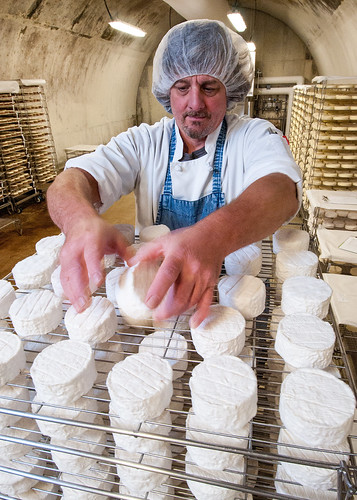
Last month, Secretary Vilsack announced a historic level of funding available for local and regional food: $78 million, including $48 million through USDA’s Business and Industry Loan Guarantee Program and $30 million through the newly-expanded Farmers Market and Local Food Promotion Program. The 2014 Farm Bill gave USDA these and other tools and resources, expanding our ability to connect rural and urban communities, increase access to healthy foods, and support rural economies through local food systems.
What does this mean for rural economies? Consider Cellars of Jasper Hill in Greensboro, Vermont. The Kehler brothers took their passion for dairy and founded a cheese making operation 10 years ago. Partnering with Vermont’s Community National Bank, USDA’s Business and Industry Loan Guarantee Program helped the company construct a 22,000-square-foot facility and expand its on-farm value-added cheese production. The project helped save 20 existing jobs and created 14 new ones in a town with fewer than 1,000 residents.
Since 2009, the Farmers Market Promotion Program (FMPP) – now expanded into the Farmers Market and Local Food Promotion Program – has funded over 450 projects including Penn's Corner Farm Alliance.
A farmer-owned cooperative of 30 farms in southwestern Pennsylvania, Penn's Corner Farm Alliance used the funds to make infrastructure upgrades to their cooperative market, including new refrigerated storage and trucks. The Alliance, which serves three dozen restaurants and over 700 Community Supported Agriculture (CSA) members in Pittsburgh, has seen their business grow 12-fold in five years. And while Pittsburgh consumers benefit from the project, rural farmers and ranchers in the surrounding area are equal partners. Fostering this type of rural-urban connection and mutual opportunity through local food systems is a cornerstone of USDA’s work.
With expanded authority and funding through the 2014 Farm Bill, the Farmers Market and Local Foods Promotion Program has the potential to help establish more connections like these across the country – and applications are being accepted now through June 20. Information about how to apply is available at www.ams.usda.gov. The Business and Industry Loan Guarantee program is available on a rolling basis throughout the year and can finance local food enterprises in both rural and urban communities. To learn more, contact your local USDA Rural Development office.
On Monday, learn more about these and other federal resources for local food systems by tuning into a special conversation hosted by the White House Rural Council, a cabinet-level council to support rural economic development and job generation. The local food-focused event will be live streamed at www.whitehouse.gov/live starting at 12:45 ET.
